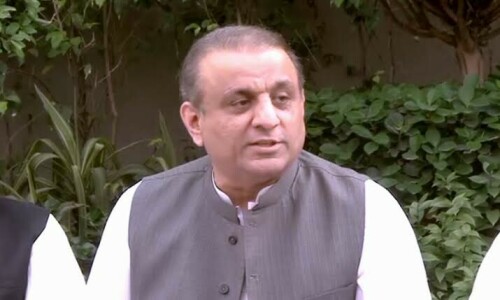AS the state struggles to formulate an effective counterterrorism policy, it should not forget the threat that militants continue to pose to Pakistan’s polio eradication efforts.
A number of vaccinators and security men deputed to guard them were killed throughout the country last year; and if the events of the last few weeks are any indication, far from being challenged, this violent trend is continuing in 2015.
As reported, a policeman deputed to guard vaccinators was shot dead in Quetta on Wednesday. The officer was not on duty when he was targeted. On the same day, two polio workers were savagely attacked and injured in a village in Jacobabad district while they were administering drops.
Also read: Two polio workers injured in attack
Earlier in January, at least two policemen guarding vaccinators were killed in Karachi in different incidents. Such brazen targeting of individuals associated with the anti-polio campaign poses a major question mark over official claims of progress on the counterterrorism front. If anti-militancy operations are indeed yielding results, how would it be possible for attackers to target polio workers at will?
This clearly shows that massive loopholes exist both in the state’s anti-militancy drive, and the campaign to counter polio.
Perhaps the state has still not realised the extreme danger polio poses to Pakistan. Figures show that last year, there were just over 300 polio cases reported in the country — by far the highest number in the world.
If earnest efforts are not made to vaccinate all children and neutralise the militants standing in the way of vaccinators, we may see an equally high, or even higher, number of cases this year. We fail to see which insurmountable barriers are standing in the way of thorough anti-polio campaigns.
It is surprising to note that even in parts of Syria and Iraq controlled by the self-styled Islamic State — an outfit hardly known for its commitment to humanitarian values — the militant group has allowed polio vaccinators access to children.
It is also true that vaccinations are continuing in Syria despite a devastating, ongoing civil war. Nigeria, another polio-endemic country which also faces a vicious Islamist insurgency spearheaded by Boko Haram, has seen no new polio cases since July 2014.
If Syria, Iraq and Nigeria, countries with just as volatile — if not more — security situations as Pakistan, can have the upper hand over the spread of polio, what is stopping us? Simply put, the anti-polio campaign — particularly its security — must be a national priority.
Published in Dawn, February 6th, 2015
On a mobile phone? Get the Dawn Mobile App: Apple Store | Google Play












































